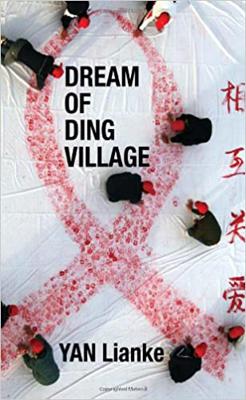
worldcat |
contact
Cindy M. Carter is a Beijing-based American translator of Chinese fiction and film. Since coming to China in 1996, she has translated over 50 award-winning independent Chinese films and documentaries, dozens of scripts, short stories, essays and poems and 2 novels. She is currently the in-house translator and editor at Ullens Center for Contemporary Art (UCCA) in 798 Art District, Beijing.
Fiction
Dream of Ding Village by Yan Lianke. 2011. Constable and Robinson (UK) / Text Publishing (Australia) / Grove Press (US). 352 pages. Prose-poetic tale of blood-selling, AIDS, profiteering and revenge set in rural Henan. (Long-listed for the 2012 Man Asian Literary Prize.)
"But the sickness had only just begun. [...] The real explosion wouldn't come until next year, or the year after next. That's when people would start dying like sparrows, or moths, or ants. Right now they were dying like dogs, and everyone knows that in this world, people care a lot more about dogs than they do about sparrows, moths or ants."
Village of Stone by Guo Xiaolu. 2004. Chatto & Windus, U.K. 181 pages.
Fictional memoir of a young woman coming to terms with repressed memories of her childhood in a Chinese fishing village. (Short-listed for the 2005 Independent Foreign Fiction Prize; Long-listed for the 2005 Dublin IMPAC Prize.)
"The Village of Stone was my entire world, my fortress without windows, a place where they had dug my grave almost as soon as I was born."
"Two people together never add up to anything more than one person added to another. That we continue to add ourselves up in this way is the reason human beings will always be lonely."
Selected Documentaries
Karamay by director Xu Xin. 2009. Mandarin with English subtitles. 371 mins. In 1994, over 450 people - mainly schoolchildren and their teachers - were killed or injured when a fire broke out in a theatre in Karamay city, Xinjiang province (see Wiki entry). The survivors, who had been attending a song-and-dance performance to entertain visiting cadres, reported that students were instructed to remain in their seats so that VIPS and party cadres could exit first. Through rare video footage and first-person interviews with families and survivors, Xu Xin documents how the story was portrayed in the official media, the public anger that erupted after the fire and the community's 15-year quest for justice.
WE: Creatures of Politics, Voices of Conscience by director Huang Wenhai. 2008. Mandarin with English subtitles. 102 mins. In the run-up to the 2008 Beijing Olympics, several generations of activists debate the future of political reform and human rights in China. (Special Jury Prize, Venice Film Festival, 2008; Screened at One World Human Rights Festival, 2009.)
Crime and Punishment by director Zhao Liang. 2007. Mandarin and dialect with English subtitles. 123 mins. Young military police patrolling the border between China and North Korea deal with career frustration and local disputes ranging from petty theft to illegal logging to false dead-body reports. (Best Documentary, Nantes Festival des Trois Continents, 2007; Best Director, One World Int'l Human Rights Film Festival, 2007.)
Fairytale, by producer Ai Weiwei. 2007. English, German, Mandarin and dialect with English subtitles. 9 hours. With 16 directors and a crew of 8 translators, Fairytale offers a behind-the-scenes look at artist Ai Weiwei's ambitious project to bring 1001 Chinese people from various walks of life to the 2007 Kassel Documenta in Germany. Subjects include: a policeman-turned-blogger who was refused a passport for his blog posts critical of Chinese law enforcement, a pair of writers whose passion for poetry and fondness for drink goes hand in hand, and a group of farmers whose trip to Kassel will be the first time they've left their village, much less their country.
Fengming: A Chinese Memoir (alt title: Chronicle of a Chinese Woman) by director Wang Bing. 2007. Mandarin with English subtitles. 184 mins. He Fengming speaks directly to the camera of her experiences as a revolutionary, journalist, accused rightist, prison camp inmate and chronicler of more than a half-century of Chinese history. (Grand Prize, Yamagata International Documentary Film Festival 2007; Young Critics Award, Cinema Digital Seoul, 2007.)
Mona Lisa by director Li Ying. 2005. Mandarin with English subtitles. 110 mins. 20 years after being kidnapped as a child-bride, a young woman named Xiuxiu manages to locate her birth parents and lands her kidnappers - the couple who raised her - in prison. Motivated by a sense of responsibility to her adoptive siblings, Xiuxiu tries to get her adoptive mother released on furlough.
Before the Flood by directors Yan Yu and Li Yifan. 2004. Sichuan dialect with English subtitles. 143 mins. As the flood waters of the Three Gorges Dam Project rise, dislocated residents of the ancient town of Fengjie clash with local cadres and try to find new lodgings. (Grand Prize, Yamagata International Documentary Film Festival, 2005; Best Documentary Feature, Lisbon Int'l Documentary Film Festival, 2005; Winner, International Competition, 2005 Cinéma du Réel Film Festival; Wolfgang Staudte Prize, Berlin Film Festival, 2005; Humanitarian Prize, Hong Kong Film Festival, 2005.)
West of Tracks by director Wang Bing. 2003. Mandarin and Shenyang dialect with English subtitles. 545 mins. Sweeping three-part documentary (I: Rust, II: Remnants, III: Rails) depicts the lives of laid-off factory workers and their children in Shenyang, China's rust belt. (Best Documentary Feature, Mexico City Film Festival, 2005; Grand Prix, Marseille Festival of Documentary Film, 2003; Grand Prize, Yamagata International Documentary Film Festival, 2003; Golden Montgolfier Award, Nantes Festival des Trois Continents, 2003; European DVD release: MK2 films.)
Paper Airplane by director Zhao Liang. 2001. Mandarin with English subtitles. 89 mins. Gritty documentary about heroin addiction and the Beijing underground music scene. A film that made the subject matter less taboo - and inspired numerous feature-film knockoffs - it's still the only one that gets the story right. (Merit Prize, Taiwan International Documentary Festival, 2002.)
Selected Feature Films
Fujian Blue, (See also: Wiki entry) by director Robin Weng (Weng Shouming). 2007. Fujian dialect with English subtitles. 87 mins. For a group of Fujian teens, filming trysts and black-mailing wealthy "remittance widows" whose husbands are working abroad is a lucrative pastime...until they fall afoul of local mafia, snakeheads trafficking in human cargo. (Dragons and Tigers Prize, Vancouver Int’l Film Festival, 2007; Pusan Int’l Film Festival/PIFF post-production grant, 2007.)
In Love We Trust by director Wang Xiaoshuai. 2007. Mandarin with English subtitles. 115 mins. When their daughter is diagnosed with leukemia, a long-divorced couple deceive their new spouses and reunite to conceive a baby whose bone marrow may save their child's life. (Special Mention Jury Prize and Silver Bear Prize for Outstanding Screenplay, 2007 Berlin Film Festival. Nominated for Golden Bear.)
Tales of Rain and Magic by director Sun Xiaoru. 2006. Mandarin with English subtitles. 95 mins. This coming-of-age tale forms the first part of Sun's Trilogy of Women. (Screened at Rotterdam Int’l Film Festival, 2007.)
Shanghai Dreams (Qing Hong) by director Wang Xiaoshuai. 2005. Mandarin with English subtitles. 123 mins. It is 1983, and Chinese reform and opening is in full swing. The old generation of sent-down factory workers want to return to their urban hometowns, but their teenaged children - born and raised in the hinterlands - are reluctant to leave behind the only lives they've known. (Prix du Jury, Cannes Film Festival 2005. Nominated for Palm d'Or.)
Dream of the Bridal Chamber, by director Guo Baochang. 2005. Mandarin with English subtitles. 120 mins. Haunting melodies and lush cinematography inform this classic Peking Opera set to film.
Season of the Horse by director Ning Cai. 2004. Mongolian with English subtitles. 105 mins. In this elegy to a disappearing culture, a Mongolian herder loses his livelihood, sees his grazing lands fenced off and sells his horse to pay for his son's education. (NETPAC award and others; see here for more awards)
Pirated Copy by director He Jianjun (See also: Wiki entry). 2003. Screenplay: He Jianjun and Cui Zi’en (see also: Wiki and IMBD filmographies). Mandarin with English subtitles. 89 mins. The lives of motley characters intersect in Beijing, against a backdrop of pirated copies of western films.
Selected Scripts and Film Treatments
Realm of Gongs by director Yang Rui. 2009 documentary film treatment.
The Forbidden Book of Woman by director/screenwriter Sun Xiaoru. 2008 script treatment.
In Love We Trust by director/screenwriter
Wang Xiaoshuai. 2006 final-draft script. 98 pages. (Silver Bear for Outstanding Screenplay, Berlin Film Festival, 2007.)
Too Sexy for the Revolution by screenwriters Li Ying and Ai Wan. 2006 script treatment.
Leaving Camp Clearwater (Gaobie Jiabiangou) by director/screenwriter Wang Bing. 2005 full shooting script. 151 pages.
Aida of Wang Village by screenwriter Wang Shuo. 2004 first-draft script. 87 pages.
Chasing the Harvest by director/screenwriter He Jianjun. 2004 script treatment. 50 pages.
Selected Essays and Art Criticism
"Spectator Perspective" by Liu Sola; "Solution Scheme" by Shu Yang; "Autobiography in Two Parts" by Yu Na (in Solution Scheme by Xu Yong and Yu Na. 2007.)
"A Conversation between Ai Weiwei and Liu Xiaodong" (in The Richness of Life: Personal Photographs of Contemporary Chinese Artist Liu Xiaodong. Timezone 8 Books. 2007.)
"Photography as Visual Sociology: Xu Yong’s Tale of Two Cities" by Daozi; "Factography: The Photographic Work of Xu Yong" by Shu Yang (in Backdrops by Xu Yong. Timezone 8 Books. 2006.)
"Is 798 a Cultural Petting Zoo?" by Yin Jinan; other essays (in 798: A Photographic Journal. Editor: Zhu Yan. Timezone 8 Books. 2004.)
"Synthetic Reality" by Pi Li; other essays (in Synthetic Reality / Hecheng Xianshi. Editors: Ni Haifeng and Zhu Jia. Timezone 8 Books. 2004.)
"Cinema and Adam's Rib: An Analysis of Women's Roles in Chinese and Western Cinema" by Xiaolu Guo. 2001.
Theatre
Amber, a multi-media theatrical production by director Meng Jinghui and playwright Liao Yimei (translated full script and projection subtitles for 2005 performances in Beijing, Shanghai, Hong Kong and Singapore.)
Lyric translations
Too many to count. Folk favorites include Wild Children (野孩子), Hu Mage, Zhou Yunpeng and Buyi. Rock favorites include Second-Hand Rose (glam-rock, Dongbei style) and Cold Blooded Animal (psychedelic Sino-grunge; albums 1, 2 and 3.)




 Bruce Humes presents a
Bruce Humes presents a